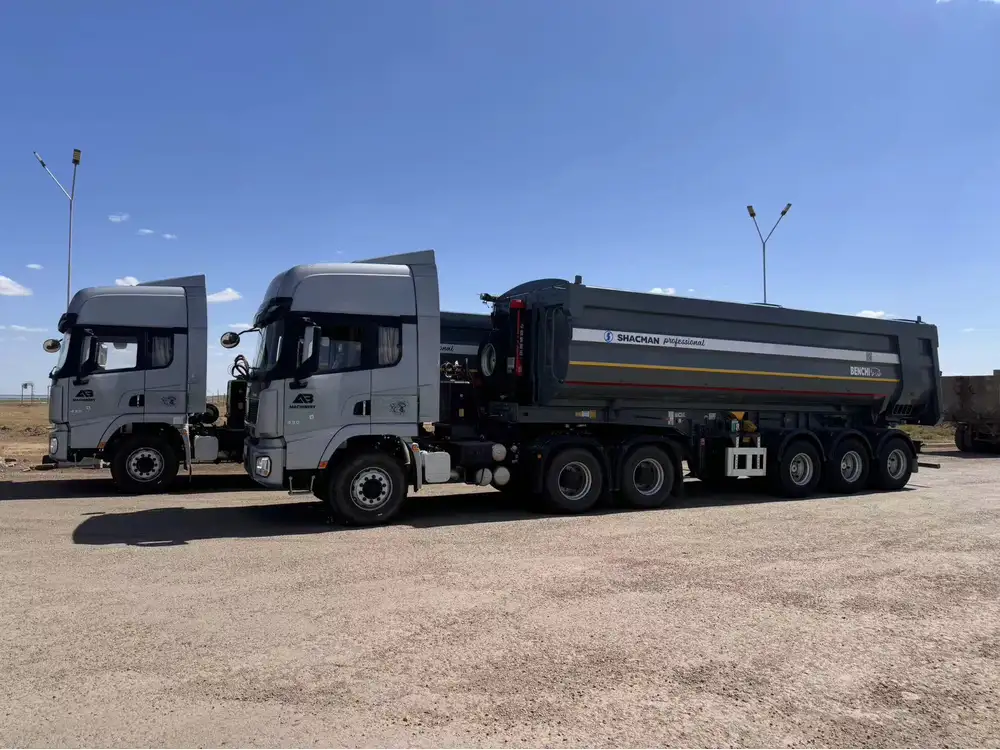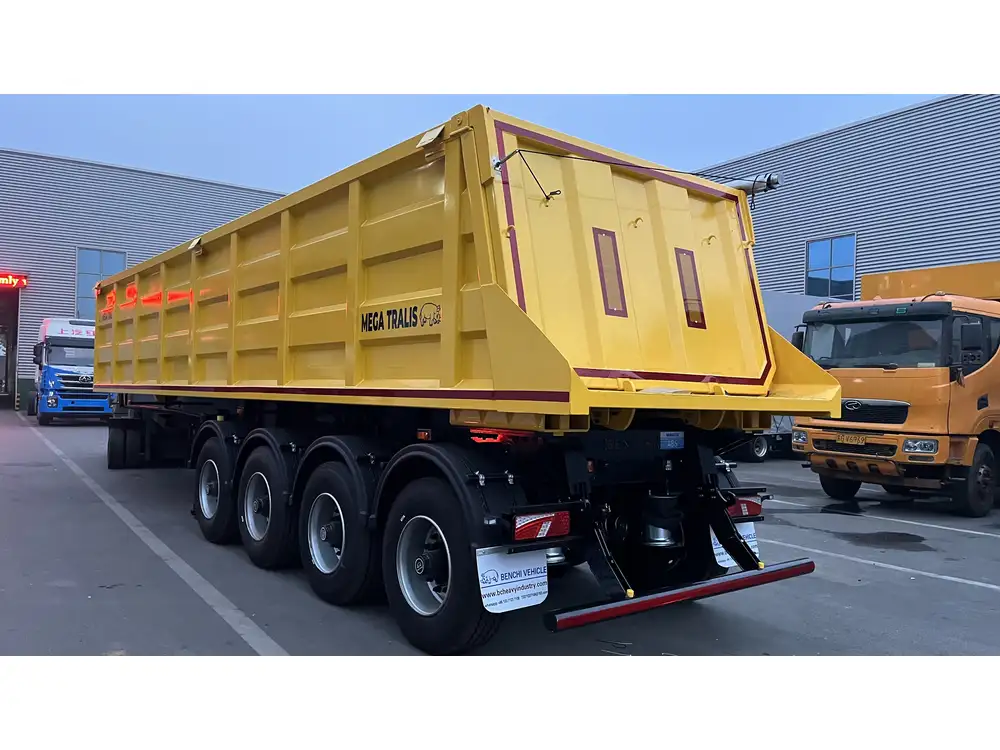Navigating the intricate world of hydraulic fluids can be a daunting task for those new to maintaining dump trailers. The right hydraulic fluid is paramount to ensuring optimal performance and longevity of your trailer’s hydraulic system. In this article, we will delve into the various aspects of hydraulic fluids pertinent to dump trailers, helping you make informed decisions and address any issues that may arise.
Understanding Hydraulic Fluids
Before deciding which hydraulic fluid is appropriate for your dump trailer, it’s imperative to comprehend what hydraulic fluids are and their primary functions. Hydraulic fluids serve several critical purposes:
- Power Transmission: They transmit force within the hydraulic system, allowing for efficient lifting and lowering of the trailer bed.
- Lubrication: They reduce friction between moving parts, thus minimizing wear and tear.
- Cooling: Hydraulic fluids dissipate heat generated during operation, ensuring the system remains within safe temperature limits.
- Corrosion Protection: High-quality hydraulic fluids contain additives that prevent rust and corrosion in metallic components.
Types of Hydraulic Fluids
Not all hydraulic fluids are created equal. Below, we provide a detailed comparison of the most common types of hydraulic fluids used in dump trailers:
| Hydraulic Fluid Type | Characteristics | Pros | Cons |
|---|---|---|---|
| Mineral Oil-Based Fluids | Derived from refining crude oil; most commonly used in many systems. | Cost-effective, widely available. | Can degrade with heat, may not be eco-friendly. |
| Biodegradable Fluids | Made from vegetable oil or synthetic esters; environmental-friendly. | Environmentally safe, less hazardous. | Generally more expensive, limited availability. |
| Water-Based Fluids | Comprise water and anti-corrosive additives. | Non-flammable, low-cost. | Lower lubricating properties, may cause freezing in low temperatures. |
| Synthetic Fluids | Chemically engineered fluids offering superior performance. | High performance, excellent lubrication. | More costly, sometimes not compatible with specific systems. |

Choosing the Right Hydraulic Fluid for Your Dump Trailer
When selecting the appropriate hydraulic fluid for your dump trailer, several factors must be taken into account:
Manufacturer’s Recommendations: Always adhere to the manufacturer’s guidelines outlined in your trailer’s manual. They often specify the type of hydraulic fluid best suited for optimal performance.
Operating Environment: The ambient temperature and exposure to environmental conditions (such as chemical exposure or extreme weather) can significantly influence your fluid choice. For instance:
- In warmer climates, mineral oils may perform satisfactorily.
- In colder environments, consider water-based fluids or biodegradable fluids with an appropriate viscosity rating.
Application Specifics: If your dump trailer is designed for heavy-duty applications, a synthetic fluid may be advisable due to its superior lubricating properties and operational stability.
Environmental Concerns: If your operations are based in environmentally sensitive areas, opting for biodegradable fluids can mitigate environmental risks.
Viscosity Matters
Apart from the type of hydraulic fluid, viscosity plays a crucial role in selecting a hydraulic fluid for dump trailers. Viscosity measures a fluid’s resistance to flow. Hydraulic fluids are available in different viscosity grades, often indicated by their ISO numerical designation. For example, ISO 32, ISO 46, and ISO 68 are common hydraulic oils. When determining the appropriate viscosity for your dump trailer, consider:
- Operating Temperature: As temperature increases, the viscosity of fluids decreases. Thus, higher viscosity fluids are preferable in high-temperature conditions.
- System Requirements: Consult your manufacturer’s specifications concerning the required viscosity under different operational scenarios.
Common Problems Arising from Incorrect Fluid Usage
Using the wrong type of hydraulic fluid can lead to a myriad of problems with your dump trailer:
Overheating: An incompatible hydraulic fluid can fail to dissipate heat effectively, leading to overheating and potential system failure.
Reduced Efficiency: The inability to transmit power efficiently due to incorrect fluid viscosity can hinder the lifting and lowering mechanism of the trailer.
Increased Wear and Tear: Inappropriate or poor-quality hydraulic fluids could exacerbate friction and lead to premature component failure.
Contamination Issues: The wrong hydraulic fluid may not provide the necessary protection against contaminants, leading to rust and corrosion over time.

Regular Maintenance Practices
To ensure the longevity and reliability of your dump trailer’s hydraulic system, implement regular maintenance practices:
Fluid Checks: Regularly inspect hydraulic fluid levels and top off as necessary. Pay attention to the fluid’s color and consistency; discoloration may indicate contamination.
Leak Inspection: Perform routine checks for leaks within the hydraulic system. Early detection of fluid leaks can prevent more significant issues down the line.
Fluid Replacement Schedule: Establish a timeline for fluid replacement based on the type of fluid used and the manufacturer’s recommendations. This schedule could range from every 500 to 1000 operating hours.
Filtering: Utilize high-quality filters in your hydraulic system. Regularly replace filters to prevent contamination from damaging components.
How to Change Hydraulic Fluid in Your Dump Trailer
Changing the hydraulic fluid in your dump trailer is a straightforward process, but it must be done carefully to avoid any complications. Below are detailed steps:
Prepare Your Trailer:
- Ensure the trailer is on a flat surface with the hydraulic system in the down position.
- Secure the trailer with wheel chocks to prevent movement.
Drain Old Fluid:
- Locate the drain plug underneath the hydraulic reservoir.
- Place a drain pan beneath the drain plug and remove it, allowing the old fluid to thoroughly drain.
Replace the Filter:
- While the fluid is draining, locate the hydraulic fluid filter.
- Use the appropriate tools to remove the old filter, ensuring no contaminants enter the system, and install a new filter.
Fill with New Fluid:
- Replace the drain plug securely.
- Open the reservoir cap and use a funnel to pour the new hydraulic fluid into the reservoir. Fill to the manufacturer’s specified level.
Bleed the System:
- Operate the hydraulic system to remove any trapped air.
- Cycle the trailer bed up and down several times to ensure proper fluid circulation and eliminate air bubbles.
Final Checks:
- Inspect for any leaks around the filter or reservoir.
- Check the fluid’s consistency and clarity to ensure no old fluid remains mixed.
Conclusion
Understanding what type of hydraulic fluid to use for a dump trailer is essential for ensuring its optimal operation and longevity. By carefully considering manufacturer recommendations, recognizing environmental conditions, and adhering to regular maintenance routines, operators can significantly reduce the risk of hydraulic system failures. This not only promotes safety but also enhances overall productivity in hauling tasks. Selecting the right hydraulic fluid and maintaining it properly ultimately leads to a reliable and efficient dump trailer, ready for heavy lifting and versatile operations.
In the dynamic landscape of trailer functionality, knowledge is power; equip yourself with the right information, and your equipment will serve you reliably through every load it carries.



